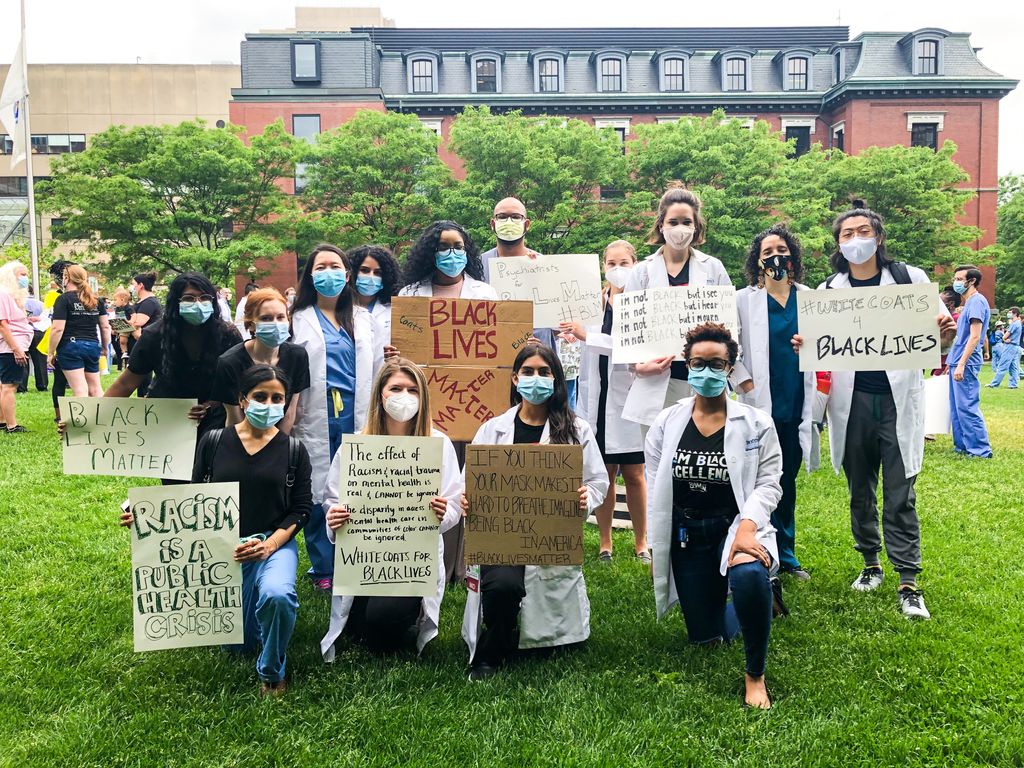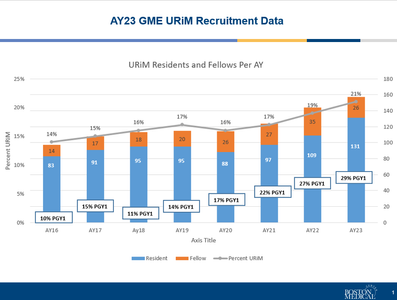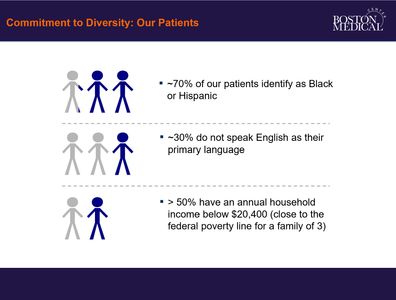Diversity, Equity, and Inclusion

“Boston Medical Center Graduate Medical Education is committed to the recruitment, engagement and advancement of underrepresented minority (URM) physicians within our residency and fellowship ranks. Through partnerships with our residency and fellowship programs, clinical departments, and administrative offices we aim to provide a diverse physician staff in order to enhance the quality of care for the patients we serve.” ~BMC GME Office of Diversity and Inclusion
Our Psychiatry Residency Program promotes diversity, equity, and inclusion within our department and hospital and advocates for persons of color and other minority groups in our communities.
Please watch below as some of our residents speak about their experiences in the program.
Spotlight on Diversity
“Spotlight on Diversity” is a video series produced by the Boston University Chobanian & Avedisian School of Medicine Office of Diversity that highlights faculty, students, and staff with diversity-related interests. Dr. Henderson, the Chair of our department, was one of the featured speakers in this series. Watch his video below!
Please visit the BUSM Spotlight on Diversity page to view more videos from other members of the Medical Campus!
Initiatives for our residents:

- Representation: Our department and residency leadership and faculty came to Boston University Chobanian & Avedisian School of Medicine and Boston Medical Center because of the patients that we serve. Like our patients, we also represent multiple ethnicities, languages, countries of origin, religions, sexualities, etc. We strive to keep conversations on difference and inequities at the forefront of our clinic work and your training experience.
- Holistic Review: Our residency application review process emphasizes the importance of giving individualized consideration to a broad range of factors—experiences, attributes, in addition to academic metrics in order to recruit a diverse and inclusive mental health workforce that is poised to serve patients from all walks of life.
- Global-Local Cultural Psychiatry Pathway: This pathway allows psychiatry residents to gain advanced knowledge and experience in the impact of cultural and/or geographic variation on the experience and treatment of psychiatric illness. This is accomplished through supplementary didactics, a designated mentor for assistance with career planning, and a longitudinal project which can be completed either locally or at an international site through one of our global partnerships. The pathway focuses on bidirectional learning and that all global work can be applied to our local ethnically and racially communities that we serve.
- Anti-racism Working Group: A resident-led initiative which focuses on racial equity and anti-racism education through book clubs, journal clubs, quality improvement projects and research collaboration.
- URM Resident Steering Committee: An inter-departmental committee created to promote the engagement and advancement of our URM residents and fellows through mentorship, educational and professional opportunities, and community building events.
- Resolution Board: A sub-committee of the Diversity & Inclusion Graduate Medical Education (DIGME), the resolution board standardizes the process for resident micro/macroaggression reporting.
Initiatives for our patient communities:

- Global & Local Center for Mental Health Disparities: The center seeks to improve the mental health of our diverse global communities, both locally in the greater Boston area and internationally, through coordinated clinical, research, and training initiatives. The Center emphasizes the importance of building the capacity of our in-country and in-community partners to provide quality mental health and psychiatric care, to investigate locally relevant topics through rigorous research methodologies, and to build the next generation of mental health professionals through education and training programs.
- Center for Refugee Health and Human Rights: provides holistic health care coordinated with social services and legal aid for asylum seekers, refugees, survivors of torture, and their families. Provides training for professionals to serve this population, conduct research to understand and implement best-practices, and promote health and human rights, locally and globally, to improve the quality of life for survivors of torture and their communities.
- Immigrant and Refugee Health Center: The BMC Immigrant & Refugee Health Center connects all of Boston Medical Center’s existing programs and expertise in immigrant and refugee health care into one central point of entry where any immigrant patient can be connected with all of BMC’s medical, mental health, social services resources that they need in order to heal, rebuild and thrive.
- Housing Stabilization Initiative: BMC supports a wide range of affordable housing initiatives to determine the best ways that health care systems can improve both community and patient level health and reduce medical costs by addressing homelessness and housing insecurity.

- Preventive Food Pantry: the BMC Food Pantry works to address nutrition-related illness and under-nutrition for our low-income patients. It fills the therapeutic gap by linking physicians and nutritionists to patients. Individuals with special nutritional needs are referred to the Pantry by BMC primary care providers who write “prescriptions” for supplemental foods that best promote physical health, prevent future illness and facilitate recovery
- Workforce development initiative: To increase economic opportunity and support healthier communities, Boston Medical Center (BMC) partners with local and national organizations on workforce development initiatives, job training, internship programs, and continuing education opportunities for patients. BMC’s human resources department also supports patients with resume preparation and interview coaching for career opportunities in industries ranging from construction to healthcare. Helping patients build skills and confidence that last a lifetime means they can reach their full potential and contribute to a stronger, healthier community.
The following residents are willing to serve as advisors and answer questions for URM residency applicants:
Name: Brandon Ilechukwu, MD
Position: Resident, PGY-2
Name: Stephanie Puga-Bernaldo, MD
Position: Resident, PGY-2
Name: German Velez, MD
Position: Resident, PGY-3
Name: Anisha Chava, MD
Position: Resident, PGY-3
Name: Edom Seyoum, MD
Position: Resident, PGY-4
Name: Natasha Nazari, MD,MHS
Position: Resident, PGY-4




